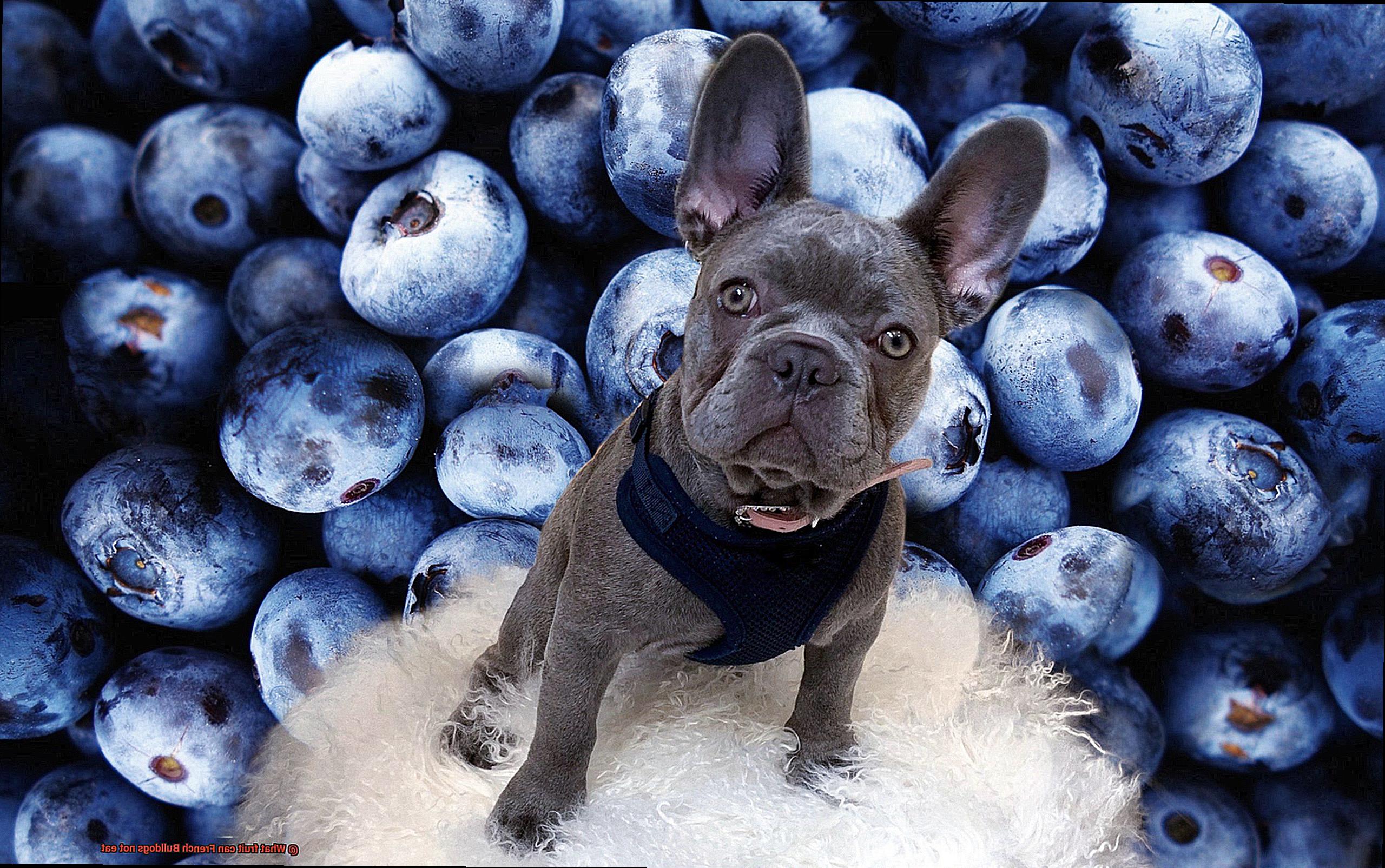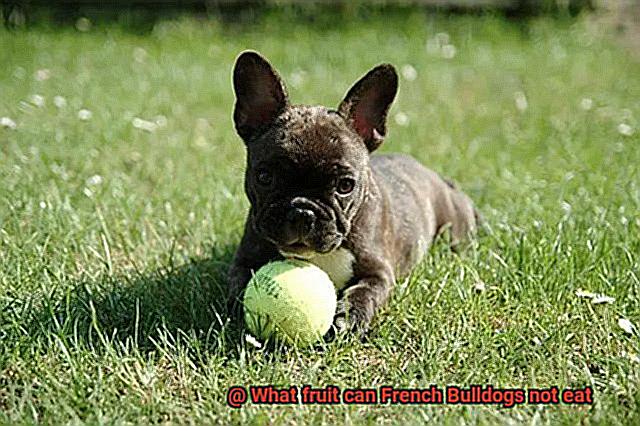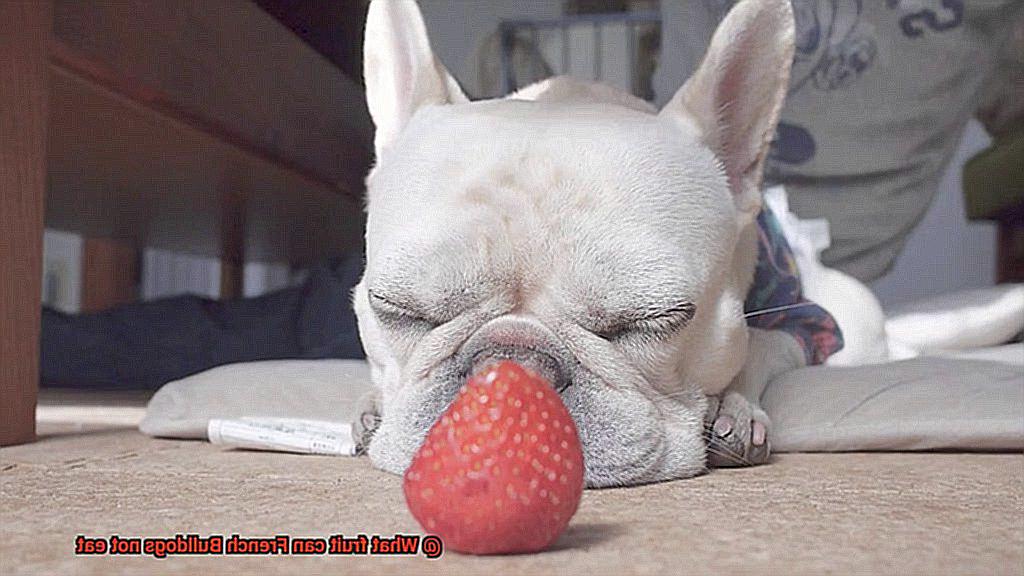What fruit can French Bulldogs not eat?
As a devoted dog owner, you always strive to provide your furry pal with the best care possible. You want to make sure they stay healthy and happy, and that includes giving them the right kind of food. While fruits may seem like a healthy treat for your French Bulldog, not all fruits are created equal. In fact, some fruits can be downright dangerous for your pup.
Picture this: you hand over a juicy fruit to your French Bulldog, and their eyes light up with excitement. But little do you know that this seemingly innocent fruit could cause serious harm to your furry friend’s health. It’s a nightmare scenario no pet parent wants to experience. Unfortunately, certain fruits contain toxins that are poisonous to dogs, causing complications like vomiting, diarrhea, indigestion, or even worse – death.
In this informative blog post, we’ll delve deeper into the question of what fruit can French Bulldogs not eat. We’ll explore why certain fruits are harmful to their health, how to recognize the signs and symptoms of ingestion, as well as what steps you should take if your pup accidentally consumes one of these forbidden fruits. So sit tight and get ready to learn how you can keep your beloved French Bulldog safe from harm while still treating them with delicious and nutritious snacks.
What fruit can French Bulldogs not eat
Contents
Grapes and Raisins
However, it’s not just about feeding them the right foods, but also knowing which foods to avoid. One fruit that French Bulldogs should steer clear of is grapes and raisins.
Grapes and raisins may seem like a harmless snack for us humans, but they can be potentially deadly for dogs, including French Bulldogs. Even a small amount of grapes or raisins can cause kidney failure in dogs, which can be fatal. Although the exact reason behind this toxicity is still unknown, experts believe it’s related to a substance found in grapes and raisins that damages a dog’s kidneys.
If your French Bulldog accidentally ingests grapes or raisins, you may notice symptoms such as vomiting, diarrhea, lethargy, and decreased appetite. In severe cases, kidney failure can develop and become life-threatening for your furry friend. That’s why it’s essential to seek veterinary care immediately if you suspect your French Bulldog has consumed any grape or raisin product.
It’s also worth noting that grape and raisin toxicity can occur with any form of grape or raisin product, including wine, juice, and baked goods containing these fruits. As responsible pet owners, we should always check ingredient lists and make sure to keep all grape and raisin-containing products out of our pet’s reach.
While there are many fruits that French Bulldogs can safely enjoy as part of a healthy diet, it’s crucial to avoid feeding them grapes and raisins to prevent any potential health issues. As always, consult with your veterinarian if you have any concerns about your French Bulldog’s diet or health.
Avocado
While humans can indulge in this tasty treat, avocados contain a toxin called persin that can be harmful to dogs, causing vomiting, diarrhea, and even heart damage.
In addition to the pesky persin toxin, avocados also have a high fat content that can cause weight gain and inflammation of the pancreas in French Bulldogs, who are already prone to obesity and related health issues. So, while you may enjoy snacking on an avocado, it’s important to resist the temptation to share with your Frenchie.

It’s also essential to note that all parts of the avocado plant contain persin – even the leaves, bark, and seed. So, if you have an avocado tree in your yard or home, make sure to keep it away from your beloved pup.
Stone Fruits

Stone fruits, like peaches, plums, and cherries, may seem like the perfect snack for your pup. However, it’s essential to avoid giving them these fruits as they can be extremely toxic.
The pits of these fruits contain cyanide, which can be fatal to dogs. Even if you remove the pit before feeding your French Bulldog a slice of peach or plum, there is still a risk that they may ingest a small piece of it. It’s crucial to keep in mind that dogs’ digestive systems are different from ours, and what is safe for us may not be suitable for them.
Apart from the cyanide risk, stone fruits are also high in sugar, which can lead to unwanted weight gain and dental problems. As we all know, French Bulldogs are prone to obesity and dental issues, so it’s best to stick to safer fruits like apples or bananas as an occasional treat instead.
Moreover, it’s equally important to avoid dried fruits as they are high in sugar and can contain harmful preservatives like sulfites. Instead, opt for fresh or frozen options when it comes to fruit treats for your furry friend.

Citrus Fruits
While these fruits may seem like a healthy snack, their high acidity levels can cause digestive problems such as stomach upset, vomiting, and diarrhea.
It’s not just the acidity that poses a risk; citrus fruits also contain essential oils that can trigger skin irritation and respiratory problems in some dogs. This is especially true for French Bulldogs who have a higher susceptibility to allergies and respiratory issues.
However, not all fruits pose a risk to your furry friend. In fact, many fruits are packed with vitamins and nutrients that can benefit their health. But when it comes to citrus fruits, it’s best to avoid them altogether and opt for safer alternatives like apples, bananas, and berries.
Other Foods to Avoid For French Bulldogs
While it can be tempting to share your food with your beloved pet, there are certain types of human and pet food that can be harmful to their health.
First and foremost, it’s crucial to avoid giving your French Bulldog any human food. While they may beg for scraps at the dinner table, many human foods can cause digestive problems and even lead to serious health issues. Foods that are high in fat or sugar, such as fried foods or sweets, can upset their stomachs and cause diarrhea. Additionally, some human foods are toxic to dogs, including chocolate, caffeine, alcohol, onions, garlic, and avocados. So next time you’re enjoying a meal, resist the urge to share with your pup.
Aside from human food, there are also certain types of pet food that French Bulldogs should steer clear of. Some cheap dog foods contain fillers like corn and soy that can be difficult for French Bulldogs to digest. Others may contain harmful preservatives or artificial colors and flavors that can cause allergic reactions or other health problems. It’s essential to choose a high-quality dog food that meets your French Bulldog’s dietary needs.
To ensure the health and longevity of your furry friend, feed them a well-balanced diet that is specifically designed for their breed. Consult your veterinarian if you have any concerns or questions about your dog’s diet.
5jZxP8q7K-8″ >
Conclusion
To sum up, French Bulldogs are lovable and faithful companions that require proper care and attention to maintain their health and happiness. Although fruits can be a nutritious addition to their diet, it’s crucial to know which fruits they should avoid. Grapes, raisins, avocados, stone fruits, and citrus fruits are all potentially harmful to our furry friends. These fruits contain toxins or high levels of sugar that can cause digestive issues, weight gain, dental problems, or even kidney failure in severe cases.
As responsible pet owners, we must always check ingredient lists and keep all hazardous foods out of our pet’s reach. It’s also vital to refrain from giving them human food or low-quality dog food that can upset their stomachs or trigger allergic reactions.
By providing your beloved French Bulldog with a well-balanced diet that meets their nutritional requirements and avoiding risky foods, you can ensure their health and longevity. If you have any concerns or questions about your dog’s diet, don’t hesitate to consult with your veterinarian for professional advice.
Remember that your furry companion relies on you for their well-being; hence it’s crucial to offer them the best possible care.




